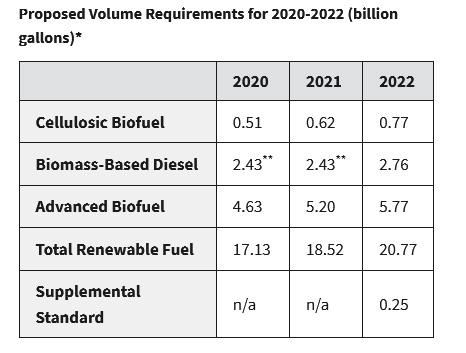 Senators Amy Klobuchar (D-MN) and Chuck Grassley (R-IA) Tuesday introduced bipartisan legislation to prohibit the EPA from reducing the minimum applicable volume of biofuels into transportation fuel after blending levels are finalized for any given year.
Senators Amy Klobuchar (D-MN) and Chuck Grassley (R-IA) Tuesday introduced bipartisan legislation to prohibit the EPA from reducing the minimum applicable volume of biofuels into transportation fuel after blending levels are finalized for any given year.
The Defend the Blend Act is co-sponsored by Senators Tammy Duckworth (D-IL) and Joni Ernst (R-IA). Companion legislation was introduced in the House of Representatives by Representatives Ashley Hinson (R-IA), Rodney Davis (R-IL), Angie Craig (D-MN), and Ron Kind (D-WI).
Renewable Fuels Association President and CEO Geoff Cooper says the bill comes at a critical time. “Just last week, EPA proposed an unprecedented retroactive reduction to the 2020 renewable volume obligations (RVOs) that were finalized more than two years ago. The RFS was created to provide long-term market certainty for our nation’s ethanol producers and farmers. Going back in time to slash RFS volumes—long after they have been finalized—undermines the purpose and intent of program and destabilizes the marketplace. We thank Sens. Klobuchar, Grassley, Duckworth and Ernst for working together to ensure the integrity of the RFS is being maintained and EPA is being held accountable.”
“ACE thanks these bipartisan Senators for introducing the Defend the Blend Act to help ensure EPA and oil refiners follow the law when it comes to the Renewable Fuel Standard,” said American Coalition for Ethanol CEO Brian Jennings. “In light of last week’s proposed retroactive cuts to the 2020 biofuel blending obligations, this bill makes clear that going back in time and revising targets that already self-adjusted not only goes against Congressional intent but is likely illegal. We need EPA to quit playing politics when it comes to administering the program and instead look to it as an important tool to immediately make progress toward decarbonization goals for the transportation sector.”







 The ethanol industry got some long-awaited announcements from the Biden Administration this week on
The ethanol industry got some long-awaited announcements from the Biden Administration this week on 


